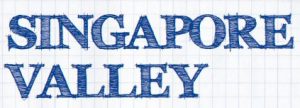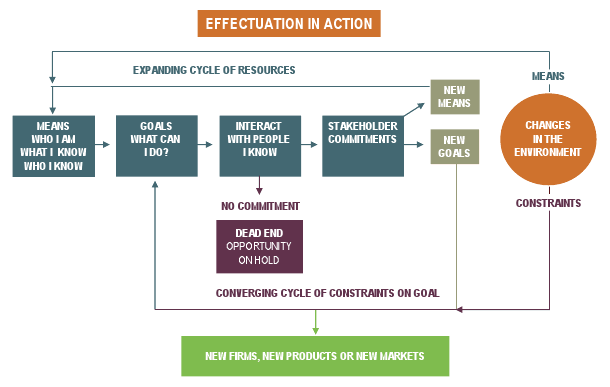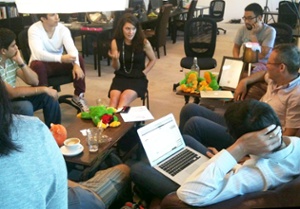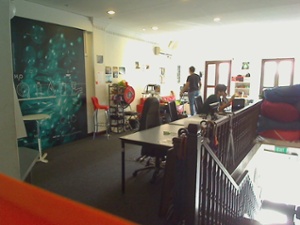 Hidayah Salamat is Associate Editor at I-S magazine in Singapore. She recently interviewed me for a feature on the island’s start-up scene but space limited the material she could publish in print. Here’s the full interview, writes Hugh Mason.
Hidayah Salamat is Associate Editor at I-S magazine in Singapore. She recently interviewed me for a feature on the island’s start-up scene but space limited the material she could publish in print. Here’s the full interview, writes Hugh Mason.
Q: “Startup” has become quite a buzzword here. How would you define it?
A: We see businesses growing through a series of stages, a bit like climbing steps on a staircase. So a startup is a business near the bottom of that staircase.
There are definite steps to climb—it’s not a steady slope—and there are real barriers to overcome at every step. At JFDI.Asia we believe that none of that has to be a mystery and entrepreneurship doesn’t have to be painful or lonely, which is why we set up our accelerator program. By the way the next one is open for pre-registrations now but it won’t suit everyone.
Interestingly, as business owners ascend the staircase, some find that they are only comfortable climbing so high. Not everyone wants to build a mega corporation and we think that’s fine. On the other hand we don’t think anyone should want to stay building a startup forever. It’s a first step on the way to somewhere, not a way of life.
Q:What do you think are the five ideals of a successful startup?
A: Actually there is some fantastic academic research that lists the five things that successful entrepreneurs do, which we use as the basis of our teaching and practice. We look for teams that show a willingness to work this way, using ‘effectual’ thinking which is very different to the way that MBAs are taught. We are much more interested in teams than ideas because we don’t have a crystal ball to predict success: only customers and the market can tell us if an idea is going to work or not.

Q: Is the startup scene in Singapore as game-changing as it appears to be? How far are we from becoming the next Silicon Valley?
A: There is an argument that Singapore has to become a hub for innovation because the days when it could create value by following other peoples’ designs and executing them diligently are passing. There are cheaper places to make hi-tech products around the region now and every time we buy a branded or patented product made outside Singapore, royalties flow out of the island. So we do need to grow our own ideas and retain the value they create.
In our opinion the government in Singapore has gone further than any other in the region to try to clear the way for innovation to happen and to set up structures that enable it. We haven’t yet seen a game-changing piece of technology, or a nine-figure exit from a local tech start-up, but the signs are there that these things could happen soon.
As for emulating Silicon Valley – it’s worth bearing in mind that it took fifty years to transform from fields of fruit trees to what we see today. We can learn from that and adapt patterns that work far more quickly.
One that seems most powerful is the way that, from the start, entrepreneurs who made money backed other entrepreneurs nearby and mentored them. They didn’t lock up their money in trusts and they shared their know-how openly. So Robert Noyce, inventor of the Integrated Circuit, co-founded Fairchild Semiconductor that went on to spawn hundreds of ‘Fairchildren’. Noyce personally mentored Steve Jobs and, twenty years later, Jobs mentored Mark Zuckerberg. So the know-how and the capital to make things happen gets passed along rapidly.
 That’s at the heart of what JFDI.Asia is trying to do. It’s why my co-founder Meng Wong’s job title isSocial Engineer. It’s why we have turned 30% of our floor-space into a cafe/club. Its why successful local entrepreneurs and investors like Hian Goh and William Klippgen have joined us as regular residents.
That’s at the heart of what JFDI.Asia is trying to do. It’s why my co-founder Meng Wong’s job title isSocial Engineer. It’s why we have turned 30% of our floor-space into a cafe/club. Its why successful local entrepreneurs and investors like Hian Goh and William Klippgen have joined us as regular residents.
Hang out at JFDI.Asia and on any one day you will see a good number of the people who actual players in the local scene come by to get stuff done, take meetings, shoot the crap or chill. It may not look like work to people who expect a cubicle farm and a boss who sits in the corner office but then that’s not they way we work.
But underpinning it there is a lot of structure and a lot of people who don’t shout about their success. In the background, many successful local tech entrepreneurs like the guys from Tencube and Jobs Central backed us to get going with cash. Equally important, they share their know-how with our teams as mentors too. Increasingly we are being asked to host events that bring the community together and people seem to like coming because even if they haven’t heard of the speaker or don’t know much about the subject, they know they will make some new friends, get some fresh ideas and most of all keep their energy up. Because what’s the point of being an entrepreneur if it’s no fun?
Q: Building a startup has become an almost overnight sensation here—everyone seems to be creating one. How do you tell the genius from the bogus?
A: A big part of our success has turned out to be stopping trying to spot winners! Instead we do the opposite – we have developed a way to identify teams that have issues which we can feel fairly certain will hold them back. We interview the teams that have the least issues to fix and find out how ‘coachable’ and willing to address those issues they are. Not everyone wants to listen to our advice and who’s to say we are always right anyway – so at that stage we are looking for emotional maturity and willingness to think laterally and rationally, putting ego aside.
 The way we screen companies is now very structured. We have developed a kind of GMAT for entrepreneurs and their ideas that we call the FrogScore. We look for a fit between the team and the idea because we don’t think there’s such a thing as a universally brilliant team—or a brilliant idea—it’s all about how a team executes the idea. So we try to give feedback and offer pointers to where people could move forward.
The way we screen companies is now very structured. We have developed a kind of GMAT for entrepreneurs and their ideas that we call the FrogScore. We look for a fit between the team and the idea because we don’t think there’s such a thing as a universally brilliant team—or a brilliant idea—it’s all about how a team executes the idea. So we try to give feedback and offer pointers to where people could move forward.
Q: Name three Singapore-based start-ups that have really impressed you. What are they like?
A: I will avoid accusations of bias by picking no JFDI.Asia teams! I am also going to cheat by nominating companies which are no longer start-ups but which were when I first met them.
- I think Viki is fantastic. I first got to know Razmig Hovaghimian, the co-founder based here, when he had just arrived in Singapore and Meng and I were also trying to raise money for JFDi.Asia. We were all working at hackerspace.sg and I was immediately impressed by his focus. He didn’t faff around going to conferences, trying to win awards, chase grants or pose around ‘doing a startup’. He just made it happen. At the risk of embarrassing Razmig I am going to say that I think his personal integrity has a lot to do with his success. That and the focus I mentioned. It’s not easy to be a parent with a young family and to start a business at the same time but did that. I feel humble around him, to be honest.
- I am hugely impressed by what Roshni Mahtani has achieved with Tickled Media. Roshni, if you are reading this I want you to know that I still kick myself that I wasn’t able to invest when we first met! I ran a content company for the best part of a decade so I know how hard it is to do what you have done with The Asian Parent and many other online media properties. Again, Roshni doesn’t seek a big profile. She doesn’t make a big deal about being a female entrepreneur. She’s a player who just does it.
- Finally I am going to nominate Tom Lokenvitz and Asher Devang at Smove (full disclosure: I am a customer). Their vision to create the systems needed to create a new concept in all-electric transport is inspiring and it works. When so many of us faff about with software and stuff that can be done quickly and relatively cheaply, these guys have taken on a heroic long-term challenge that really could change the world and make Singapore a showcase for something game-changing.
Q: What kind of an environment breeds startups? Following that, how or where do you think founders here like to work, breakout and get ideas?
A: I have worked with something like 350 early-stage businesses in ten countries now and I see the same vital ingredient: relationships. It’s so easy to focus on money, technology or buildings but actually time and again around the world it seems to be community that matters. For sure, things like Venture Capital matter, but Social Capital is perhaps the vital ingredient.
 I am proud that Meng Wong and I were instrumental in co-founding Hackerspace.sg, which was Singapore’s very first place specifically created by the startup community to bring that community together. We did it without any government or commercial support and it’s great to see that, since then, the concept of co-working and many different communities of ‘ideas people’ have followed. Our Joyful Frog innovation campus is just one of those and like all of them it will need to keep changing as we learn how best to create sharing, serendipity and success.
I am proud that Meng Wong and I were instrumental in co-founding Hackerspace.sg, which was Singapore’s very first place specifically created by the startup community to bring that community together. We did it without any government or commercial support and it’s great to see that, since then, the concept of co-working and many different communities of ‘ideas people’ have followed. Our Joyful Frog innovation campus is just one of those and like all of them it will need to keep changing as we learn how best to create sharing, serendipity and success.
Q: Say we’re at a networking session or even a party – are you likely to tell who’s founded a startup and who’s heading a—for the lack of a better word—mature company?
A: Five years ago I would have said you could spot startup people and ‘big company people’ a mile off. They were like chalk and cheese. But increasingly I meet people in senior positions in larger businesses who wish they had done the entreprenuerial thing. Now, from a position of strength, they either want to try it personally, or to work with entrepreneurs and build on the network and experience they have because of their corporate position. So it’s harder to separate them. There’s a growing recognition that it’s extremely hard to make innovation happen inside large corporations and one of the things we are trying to pioneer at JFDI.Asia are structures that link the energy of startups with big companies.
I do think there’s an assumption amongst some millenials that somehow the startup world belongs to single, childless people of their generation. By number that’s true: most people who identify as entrepreneurs are in their 20s. But research by the Kauffman foundation shows that the average age of a successful entrepreneur is actually 38.
In truth I think a lot of it is about self-awareness, not chronological age. Personal integrity allows you to create a successful business, it shows in the way you hold yourself and interact with people and it can come at any age. Most of us take a few of life’s knocks to learn the lessons, me included!
Q: I’m aware that JFDI spearheads a few initiatives, many in the form of events, to spot and mold future startups. One of them is the JFDI Happy Hour. Could you tell me more about these events, which (if any) of them are happening in the third quarter of this year (from June onwards) and if you have any images from past events you could share with us for the story?
A: We are trying to run an event every single weekday evening at the Joyful Frog innovation campus. We are experimenting to see what people want. Three things that seem to be working:
- Every week we have a ‘startup clinic’ when 3 or 4 early stage business owners come along, talk about what is holding them back, and we try to fix it then and there. So far it seems to be working well – it’s very satisfying when our mentors are able to offer immediate advice that moves someone forward.
- We have opened up the core curriculum that we teach to start-ups on our accelerator program to the general public. It’s a chance to learn alongside the guys currently going through the program, to cover all the basics in 12 sessions (one each week) and there’s no ongoing commitment if you don’t want to go with JFDI.Asia for the future
- Since we opened up our doors we have held Open House every Friday from about 5.30 onwards. A random collection of entrepreneurs, investors and mentors comes by and the whole point is for people to meet with no expectations. We get very senior and first time people along. Sometimes 20 folk show up and then everyone gets to meet, sometimes it has been as many as 200 and that’s a different kind of party but somehow it seems to work!
Material based on this interview first appeared a recent I-S Magazine feature

